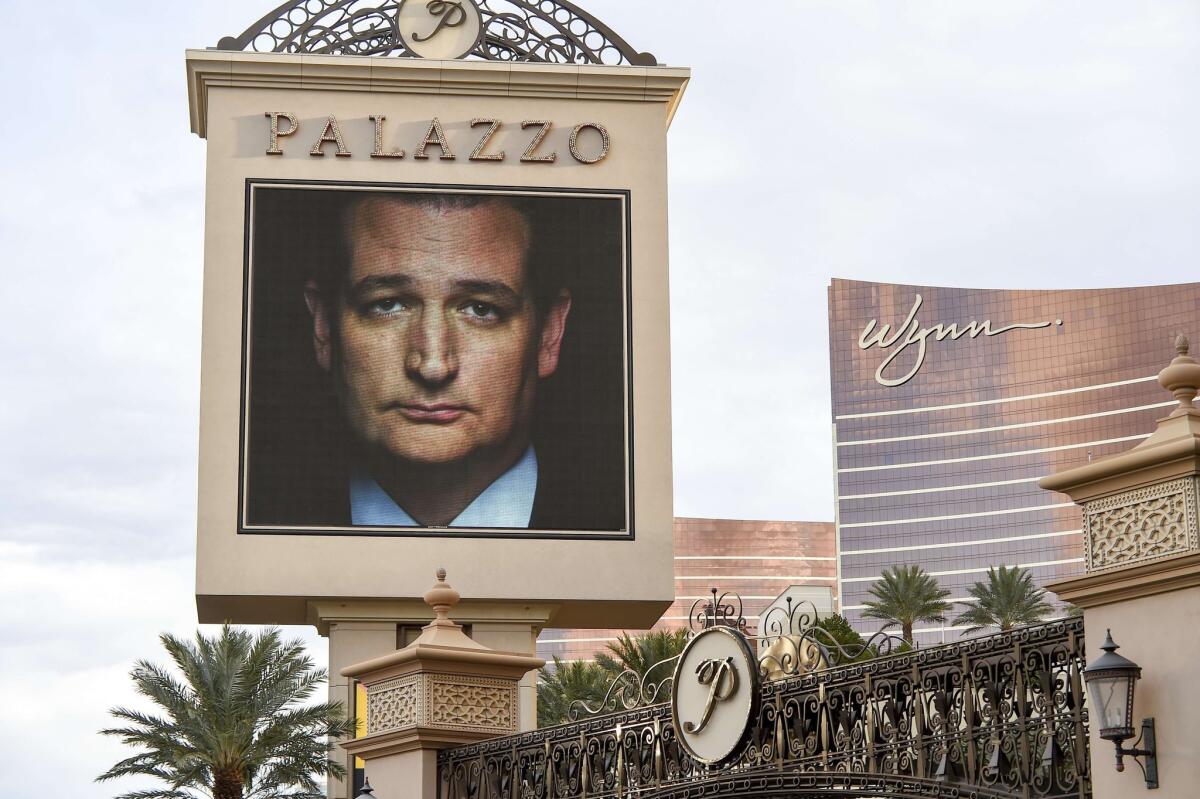Column: Ted Cruz’s slippery sales pitch for a tax overhaul

The image of Republican presidential hopeful Ted Cruz is seen in a display announcing the upcoming Republican presidential debate in Las Vegas, Nev. on Dec. 14.
It’s looking more and more as if Ted Cruz, the firebrand conservative from Texas, will be Donald Trump’s main rival for the Republican presidential nomination. So it’s worth digging a little more deeply into Cruz’s views to see what kind of conservative he is.
Let’s begin with the proposal Cruz calls the cornerstone of his economic policies: his tax plan.
Cruz has suggested replacing the federal income tax with a 10% flat tax. Everyone, rich and poor, would pay the same rate.
It’s simple. It’s bold.
“Imagine … every American filing his or her taxes on a postcard or an iPhone app,” Cruz says.
Cruz’s tax plan ... relies on the supply-side theories of economist Arthur Laffer, trusting that more income in the hands of the wealthy will ignite an economic boom.
On this score, Cruz outdoes Trump and Marco Rubio, who have proposed plans that reduce the number of tax brackets and lower the top rate, but not as dramatically.
But there’s a catch — actually, several catches.
Cruz’s plan would deliver most of its benefits to the wealthy. High-income taxpayers who currently pay taxes at rates up to 39.6% would get a windfall. Middle-income taxpayers might see their tax bills reduced about 1.5%. This is not a middle-class tax cut.
And the Cruz plan would blow a giant hole in the federal budget. The Tax Foundation, a conservative group that supports lower tax rates, estimates that Cruz’s income tax would subtract more than $11 trillion in revenue over 10 years. (The Cruz campaign points to the Tax Foundation’s estimates as the best analysis of the senator’s plan.)
Join the conversation on Facebook >>
To raise enough money to keep the government running, Cruz adds what experts call a “business transfer tax” and he calls a “business flat tax” — a 16% fee that employers would pay on their profits plus whatever they spend on wages and employee benefits. Like the flat income tax, it’s simple, bold and efficient.
But once again, there’s a catch or two.
In an earlier column, I erred by calling Cruz’s business tax a sales tax. Actually it’s more like the so-called value added or consumption tax that European countries use. If enacted, it will be baked into — and will therefore increase — the price of every product and service, including groceries.
Liberals generally dislike VATs because they’re regressive. Wealthy people don’t consume all their income; they have enough left over, even after spending on luxuries, to save and invest — activities that are (appropriately) tax-free. But poor people consume almost every penny they make, which means more of their income is subject to the VAT.
Conservative economists, for their part, dislike this kind of tax because it’s mostly hidden. “If the United States is to have a VAT, it should be adopted in the light of day, not snuck through as a business tax,” wrote Alan Viard of the American Enterprise Institute. “And, once adopted, its tax burden should be made visible to the American people, who have a right to know the full cost that they’re paying for their government.”
Instead, Cruz’s tax appears to have been designed to look deceptively painless.
For one thing, Cruz lowballs the cost. He says the rate would be 16%, but the Tax Foundation notes: “This is equivalent to a credit-invoice value-added tax or sales tax of approximately 19%.”
Here’s why: If you bought a $100 pair of shoes in a state with a 19% sales tax, your total bill would come to $119.
But under the Cruz plan, with the same bill for $119, the senator would say your tax rate is only 16% of the total — since $19 is 16% of $119. He calculates by subtraction rather than addition.
Cruz also indulges in fuzzy economics when he promises that, if he’s elected president and gets his way, a family of four will pay “no taxes whatsoever — income or payroll — on the first $36,000 of income.”
That’s true only in the sense that his plan changes the current 15.3% payroll tax (which workers now split with their employers) into a 16% business tax that employers pay. The payroll tax will actually increase a little; it just won’t show up on your paycheck anymore. As any economist will tell you, the money will still come out of your wages.
Cruz’s tax plan does have some virtues, but it doesn’t even try to limit the federal deficit in the short run. Instead, it relies on the supply-side theories of economist Arthur Laffer, trusting that more income in the hands of the wealthy will ignite an economic boom. And the senator’s sales pitch is downright slippery. That’s not a desirable quality in a politician. In the case of Ted Cruz, it’s a trait that bears watching.
Twitter: @doylemcmanus
Follow the Opinion section on Twitter @latimesopinion and Facebook
MORE FROM OPINION
Not much love for the ‘freedom agenda’ at GOP debate
You don’t have to be religious to revel in the holiday season
Ryan shows compromises can be reached in the House without brinkmanship
More to Read
A cure for the common opinion
Get thought-provoking perspectives with our weekly newsletter.
You may occasionally receive promotional content from the Los Angeles Times.







